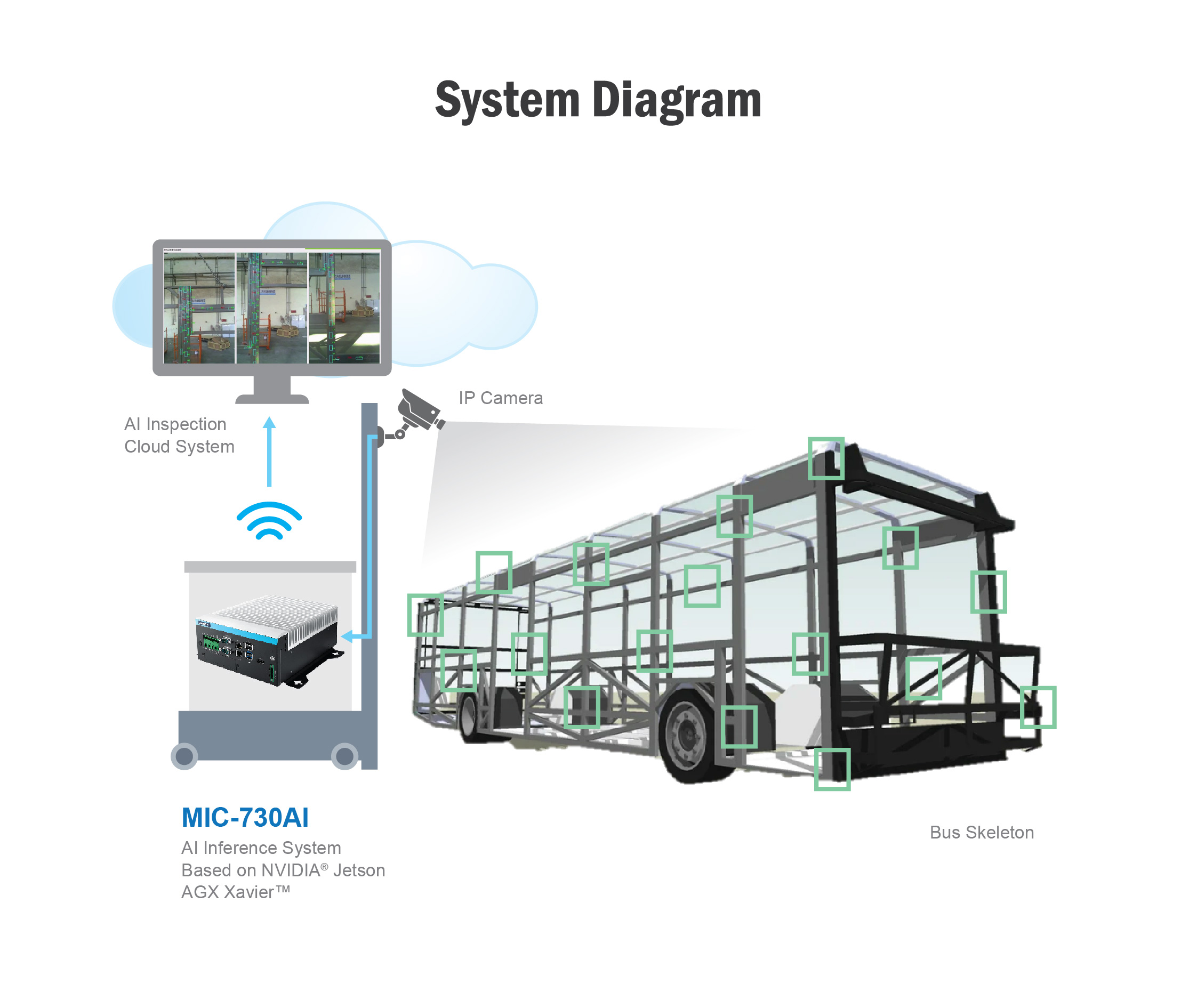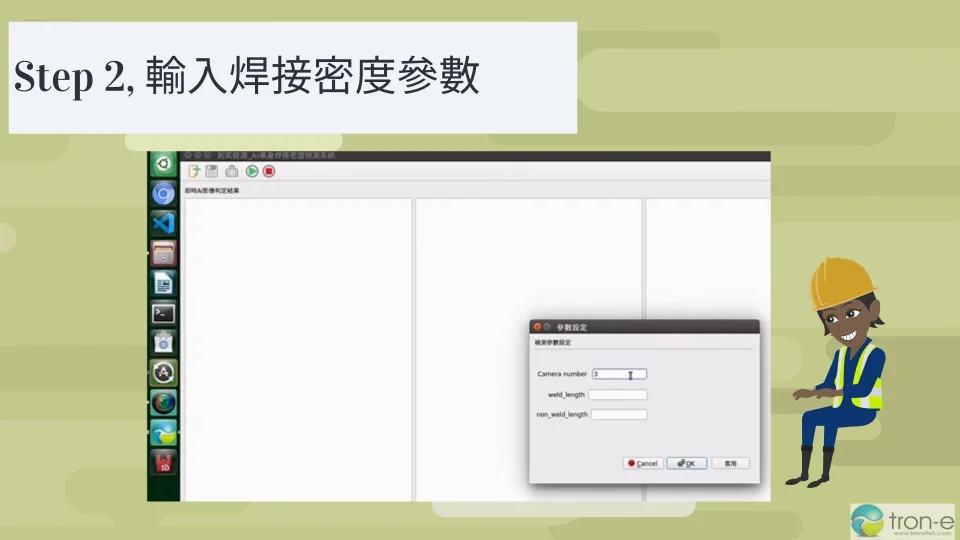AI Inspection for Bus Frame Welding to Meet ECE R66 Standards to Ensure Vehicle Structural Safety
4/17/2023
-(1).jpg)
Tron-E has collaborated with Advantech to develop an AI inspection system for bus-frame welding, replacing traditional time-consuming and labor-intensive inspections with efficient and precise methods to ensure the safety of large buses.
Welding Quality: Crucial to Vehicle Structural Safety
After long hours of high-intensity work, welders inevitably become tired, dizzy, or distracted. However, for the manufacturing of buses, an industry that is critical to personal safety, if defects are not identified and dealt with before delivery, accidents and serious casualties may occur on the road.
Kevin Wei, Senior Manager of Advanced Technologies at Tron-E noted that “based on experience with Computer Aided Engineering (CAE) over the past few years, their biggest concern is the possibility of discrepancies between the design as analyzed through CAE, and the actual manufactured result, which may come with safety issues. To mitigate this problem, CREAT Energy Technology has developed its own AI system to ensure manufacturing quality.”
Inspection of bus frame welding is very time-consuming and labor-intensive. Wei explained that traditional welding inspections require the manual use of tape measures. For a large bus, there are more than 500 welding points that need to be checked one by one. This process generally takes at least two hours to complete one inspection. “The heavy inspection workload also increases the chance of misjudgments,” Wei noted. “This makes it difficult to accurately verify compliance in quality consistency and frame strength."
Efficient, Swift, and Accurate AI Inspections Improve Welding Defect Detection
To tackle inspection bottlenecks, Tron-E developed an AI system dedicated to bus frame welding inspection. The system is based on AI visual recognition of weld pitches and weld bead sizes. By collecting photos of different defects, classifying them, then feeding them to the algorithms developed by Tron-E, the AI became trained and ready.
The trained AI model is stored in a mobile cart equipped with three cameras, an AI hardware platform, a display screen, and lithium batteries, allowing it to photograph the welded vehicle frames in the factory. AI inference is then performed, with results shown on the cart display in real time.
By using the cart display, inspectors can immediately notify the personnel responsible as soon as substandard weld beads are discovered. After corrections are completed, the inspection will be carried out again until all weld beads meet the requirements. The resulting final inspection file is then saved and uploaded to the server as part of the electronic production history of the bus.
The mobile cart, with top, middle, and bottom cameras, will circle the bus frame once to collect pictures of the welding from all angles for identification and comparison. This ensures no defects escape the sharp “eyes” of the AI system. Compared with the original process, it only takes 20% of the time for the system to inspect one large bus with hundreds of welds. The traditional method takes at least two hours with significantly greater labor costs.
A Reliable AI Hardware Platform With Exceptional Performance
A robust and powerful hardware platform plays a key role in the smooth operation of an AI quality control system. In a factory welding environment, there are particular challenges for a bus frame welding AI inspection system. There may be a great deal of iron dust in the environment and the power supply needs to be configured for the cameras and large amount of data storage.
According to Wei, Tron-E evaluated multiple AI hardware platforms on the market. He realized that some of these platforms lack the comprehensive features required for their applications, while others claim to have sufficient capabilities but have only been newly launched and are untested by the market, making Wei doubtful of their stability and availability. "Advantech, on the other hand, is not only the leading brand of industrial computers but also has a long history of AI product manufacturing, which is why we chose the Advantech MIC-730AI,” said Wei. As it turns out, ever since the Advantech MIC-730AI was delivered to Tron-E, operations have been consistently stable and have shown excellent performance.

Complete Functionality and Support Allows for Faster Project Completion
The Advantech MIC-730AI is an AI inference system based on NVIDIA Jetson Xavier. The system shows exemplary performance in AI visual recognition while the fanless design prevents dust from being drawn into the computer chassis. This ensures stable operation. The system also has low power consumption which allows it to run on battery power while performing AI inspection.
The MIC-730AI also provides abundant I/O interfaces including multiple USB ports to connect an array of cameras. When more I/Os are required, users can simply install additional interfaces through Advantech's iDoor module or plug-in iModule. The large number of images can be handled by expanding storage space to 1TB on an SSD inside the MIC-730AI.
In terms of technical support, resources provided by Advantech include the MIC-730AI-exclusive development Board Support Package (BSP) software, and the English and Chinese manuals. "Advantech provided comprehensive technical data and development tools that satisfy all our needs. Even 3D-model drawings of the product were included, which enabled us to configure and integrate the mobile cart and AI systems much faster than we expected,” Wei said. “This allowed the inspection system to be applied to factory production lines very quickly.”
Eliminating Safety Hazards at Every Stage to Ensure Bus Safety
Frame welding quality is critical to the safety of buses. In the past, due to limited manpower and the long working hours required to fully inspect a vehicle, the inspection authorities usually sampled only one vehicle when conducting their regular product inspections. However, even if a sample passes inspection, it does not mean that other vehicles produced in the same factory also possess the same level of integrity.
The AI inspection system developed through the collaboration between Tron-E and Advantech has produced a system that is both accurate and efficient. This system ensures product quality and helps eliminate potential hazards that jeopardize the safety of buses from the production end and ensures the consistent quality of every manufactured vehicle.
In addition to the aforementioned AI system in Tron-E factories, Wei also plans to utilize Advantech's MIC-730AI to develop various other AI inspection systems. The plan is to export specialized AI applications to Tron-E’s partners outside of Taiwan, allowing more car manufacturers to create safer products with consistent quality.

/MIC-730AI_Front-Left_P20191108114747.jpg)



